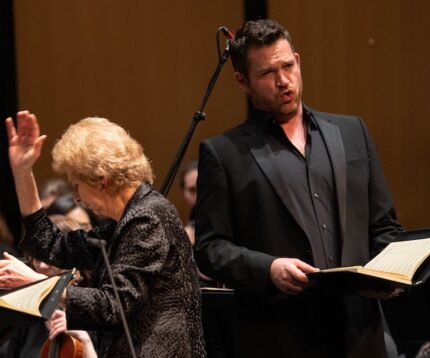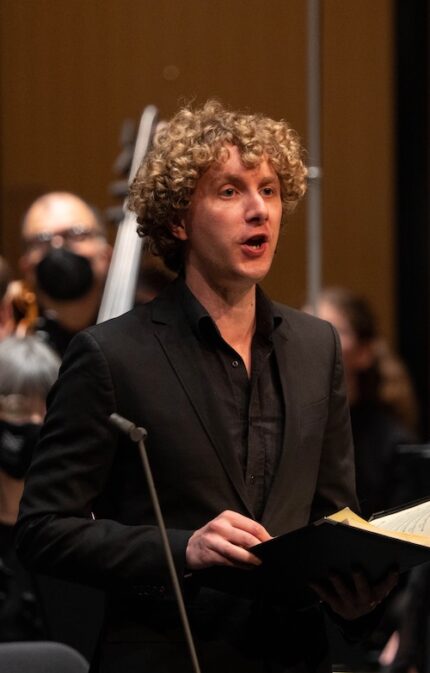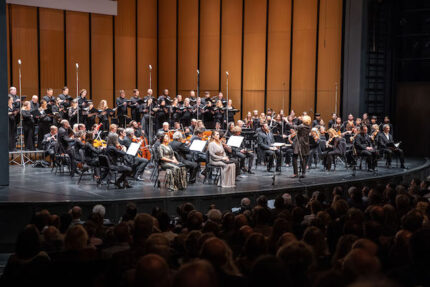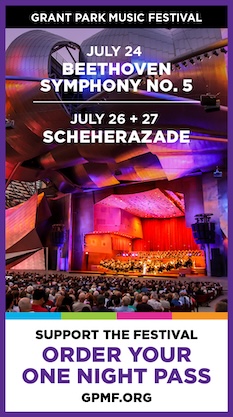Music of the Baroque marks Holy Week with a moving and dramatic “St. Matthew Passion”

Music of the Baroque has often presented Bach’s great choral works to mark the Lenten season. So it was again Monday night when Dame Jane Glover led a Holy Week performance of Bach’s St. Matthew Passion before a packed house at the Harris Theater.
Bach’s preceding St. John Passion may have the greater theatricality but the music of the St. Matthew Passion is on a higher plain altogether. Matthew is not only the largest of the composer’s sacred works, but one of the cornerstones of Western art, with music that is extraordinarily varied, noble and elevated, even by Bach’s standard.
The St. Matthew Passion is cast on an epic scale, spanning 160 minutes and scored for two orchestras, two full choruses and children’s chorus and six primary soloists with as many smaller parts taken by chorus members.
The work closely follows the title gospel in a fast-moving narrative of Christ’s suffering, crucifixion and resurrection. Most of the musical richness is found in the choruses and arias for the four main soloists, which amplify and reflect upon the larger spiritual meaning of the unfolding action.
Glover is a veteran hand at these large-canvas choral works, and Monday’s performance provided a virtual seminar in Bach conducting—pacing the narrative with firm momentum, ideal tempos and fine balancing of the orchestras, soloists and choruses. There were passing moments at the start of some arias where soloists and orchestra weren’t completely in synch but considering the length and complexity of this leviathan the performance was largely polished across all fronts.
Glover’s past Bach performances have sometimes shorted an essential spiritual quality but such was not the case Monday night. There was a greater expansiveness overall in her direction and more varied dynamics and phrasing. She balanced the fiery drama–as in the storm chorus and Judas’s betrayal–with a delicate inward expression at such moments as Jesus’s death.
Brandon Cedel made a notable Lyric Opera debut as Masetto in the 2019 Don Giovanni and he delivered a commanding performance as Jesus. The singer’s restless stage presence and forceful vocalism didn’t always convey otherworldly dignity but vocally Cedel’s dark bass-baritone brought firm and weighty authority to Jesus’s utterances.

With his mop of curly blond hair, Gwilym Bowen resembled the young Roger Daltrey, and the British singer’s high, flexible tenor proved ideal for the Evangelist. If his narration seemed a bit subdued in Part One, Bowen kept the intensity in reserve for the climactic scenes, delivering the account of Jesus’ suffering and crucifixion with wide expressive range and theatrical fervor.
The other soloists were largely on the same level.
Paul Appleby didn’t have that much to do but was hugely impressive in his opportunities. In “Ich will bei meinem Jesu wachen,” he sang with a vibrant and penetrating tenor and handled the challenging coloratura with consummate ease. MOB regular Roderick Williams deployed his warmly confiding baritone to fine consolatory effect in “Mache dich, mein Herze, rein.”
The two female voices were light-voiced in the modern Bach manner but proved worthy soloists. After some initial unease, Tess Altiveros brought a pure youthful tone and graceful singing to her arias. The young soprano seemed to grow in confidence and expressive depth as the evening went along and Altiveros was at her best in a sensitively rendered “Aus Liebe will mein Heiland sterben”
The alto soloist has some of the most inspired music in this work. Krisztina Szabo was largely up to the assignment though she had a few unsteady moments and seemed shaky in the more formidable coloratura passages. Still, the mezzo rose to the occasion when required, including a rapt rendering of “Erbarme dich,” which fully conveyed the stoic lamentation of the aria. Szabo also blended graciously with Altiveros in the duet “So ist mein Jesus nun gefangen.”
The orchestra—or orchestras—played with polish and tight-knit ensemble in their corporate guise and brought individual distinction to the numerous obbligato instrumental solos.
Under Andrew Megill, the MOB Chorus seems to be reaching a new artistic peak. Divided into two entities, the ensemble was superb all night, bringing daunting power to the big dramatic sections as well as a more nuanced degree of quiet dynamics. “Wir setzen uns mit Tränen nieder” concluded the evening with an inexorable and deeply moving sense of catharsis.
Chorus members handled the smaller solo roles adeptly, none more so than baritone Kevin Krasinski as a characterful Pontius Pilate.
The performance of Bach’s St. Matthew Passion will be available On Demand April 7 through May 5 at baroque.org.
Music of the Baroque closes its season May 7 and 8 with Jane Glover leading a program that includes Vanhal’s Symphony in G Minor, Sinfonia concertantes by Haydn and Dittersdorf, and Mozart’s Symphony No. 34.

Posted in Performances
